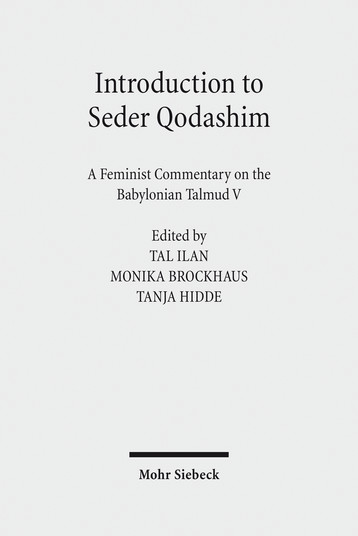Judaistik
Introduction to Seder Qodashim
A Feminist Commentary on the Babylonian Talmud V
Ed. by Tal Ilan, Monika Brockhaus and Tanja Hidde
[Einführung in Seder Qodashim. Eine feministische Auslegung des Babylonischen Talmuds V.]
2012. XI, 385 Seiten.
134,00 €
inkl. gesetzl. MwSt.
inkl. gesetzl. MwSt.
Leinen
ISBN 978-3-16-151930-7
lieferbar
Veröffentlicht auf Englisch.
Die Ordnung Qodashim in der Mischna und dem Babylonischen Talmud thematisiert den Tempel und dessen Rituale, vor allem die Opfergaben. Es ist bekannt, dass der jüdische Tempel in Jerusalem, so lange er existierte, eine Einrichtung war, die fast ausschließlich von Männern gestaltet und besucht wurde. Die feministische Auslegung des Seder Qodashim beabsichtigt, Nischen in diesem ausgeklügelten System zu entdecken, in denen Frauen präsent und aktiv waren. Zu den Themen der Aufsätze des vorliegenden Bandes gehört die Darstellung der Unterschiede zwischen der männlichen und der weiblichen Teilnahme am Tempelkult in den mischnaischen und talmudischen Texten. Die Beiträge enthalten eine ungewöhnliche Auswahl von Themen im Bezug auf Tempel und Geschlecht, die von angesehenen Wissenschaftlern aus dem Bereich der rabbinischen Literatur verfasst wurden. Der Band fasst zwei Tagungen zusammen, die in Berlin und Jerusalem stattfanden und sich mit der Ordnung Qodashim beschäftigten, und leitet damit die Reihe der feministischen Auslegung dieser Ordnung ein. Mit Beiträgen von: Moshe Benovitz, Monika Brockhaus, Aryeh Cohen, Federico Dal Bo, Klaus Herrmann, Tal Ilan, Jane Kanarek, Reuven Kiperwasser, Gail Labovitz, Moshe Lavee, Marjorie Lehman, Andreas Lehnardt, Sarra Lev, David Levine, Dalia Marx, Tirzah Meacham, Ishay Rosen-Zvi, Ze'ev Safrai, Günter Stemberger, Christiane Tzuberi, Dvora WeisbergInhaltsübersicht
Tal Ilan: Introduction1. Women in the Temple
Günter Stemberger: Did Women Actively Participate in the Sacrificial Cult of the Temple of Jerusalem? Some Preliminary Observations – Andreas Lehnardt: »The Scent of Women.« Incense and Perfume in ySheq 5:2 (Sheqalim) – Marjorie Lehman: Reading the Gendered Rhetoric of Yom Kippur (Yoma) – Moshe Benovitz: Miriam bat Bilgah in the Temple: Self, Symbol, Substitute or Stereotype? (Sukkah) – Ishay Rosen-Zvi: The Sotah in the Temple: A Well-Ordered Choreography (Sotah) – Tirzah Meacham: How Pragmatism Trumps Dogmatism: Marginalization and the Masses in the Case of Coming to the Temple (Niddah)
2. Women after the Destruction of the Temple
Aryeh Cohen: The Gender of Shabbat (Shabbat) – Gail Labovitz: The Omitted Adornment: Women and Men Mourning the Destruction (Mo'ed Qatan) – Klaus Herrmann: Do Women have Access to the Divine Realm? Temple Ideology in Judaism (Hagigah) – Christiane Tzuberi: »And the Woman is a High-Priest«: From the Temple to the Kitchen, From the Laws of Ritual Im/Purity to the Laws of Kashrut (Toharot) – David Levine: Why No Women in the Beit Midrash?
3. Women in the Temple and in Seder Qodashim
Dvora Weisberg: Clothes (un)Make the Man: bMenahot 109b (Menahot) – Jane Kanarek: All are Obligated: Sacrifice, Sight and Study (Arakhin) – Monika Brockhaus: אתנן זונה ומחיר כלב: How do the »Harlot« and the »Dog« Affect the Sacrifice (Temurah) – Federico Dal Bo: »Women to Think with:« Sexual Transgressions as Heuristics in bKeritot 17a-20a (Keritot) – Dalia Marx: Tractate Qinnim: Marginality or Horizons (Qinnim)
4. Women in Seder Qodashim
Tal Ilan: Males are for God, Females are for Us: Sacred and Kosher Slaughter Rhetorics in Seder Qodashim and Tractate Hullin (Hullin) – Moshe Lavee: Birth, Seminal Emission and Conversion: Gender, Self-Control and Identity in bBekhorot (Bekhorot) – Reuven Kiperwasser: Body of the Whore, Body of the Story and Metaphor of the Body (Bekhorot) – Sarra Lev: »Metaphors of Me'ilah: 'Metaphoric' Use of the Word מעל in Tanakh and in Rabbinic Sources« (Me'ila)
Appendix
Ze'ev Safrai: The Place of Women in Non-Establishment Religion During the Period of the Second Temple, the Mishnah and the Talmud
